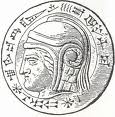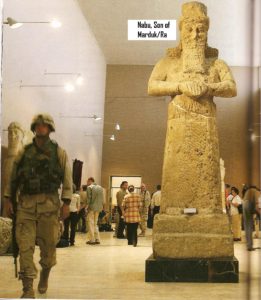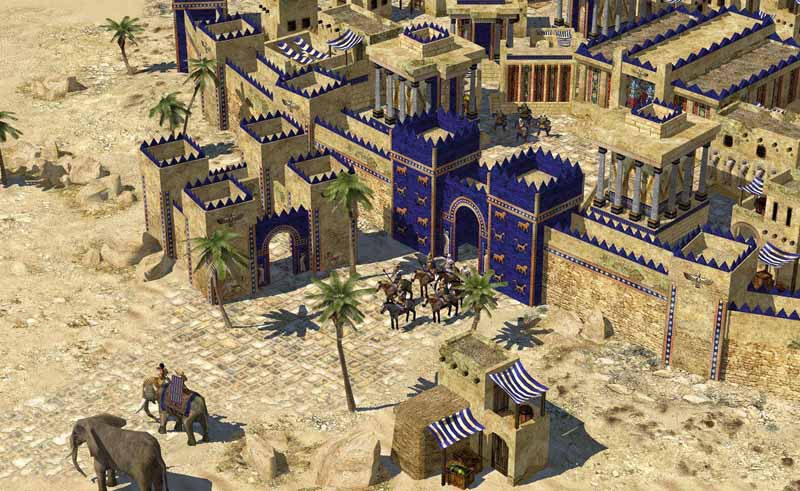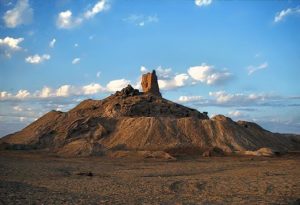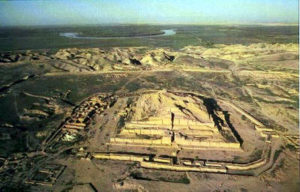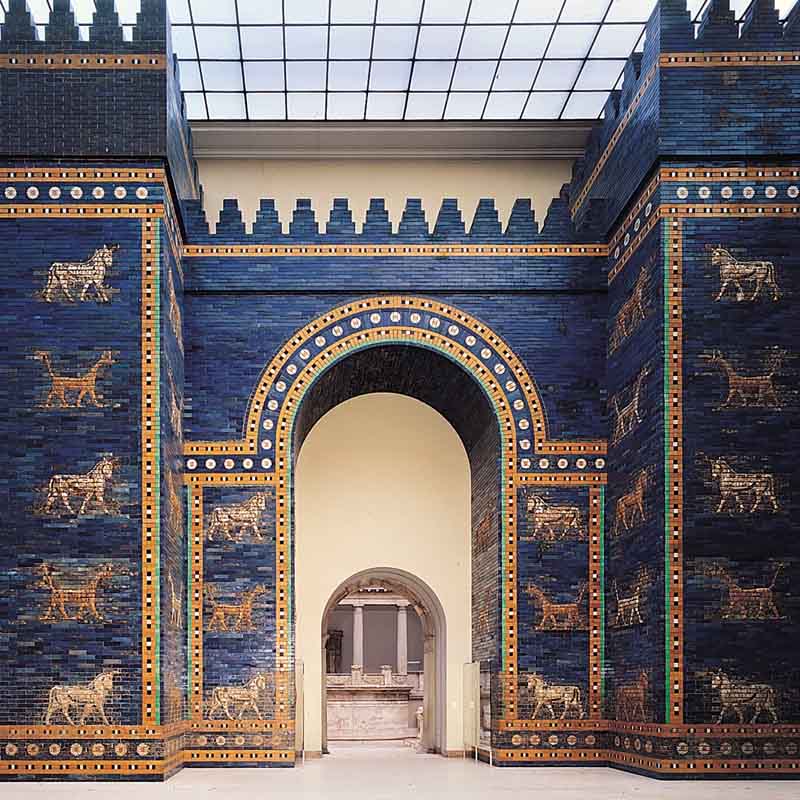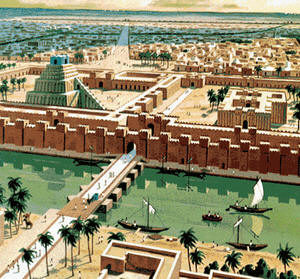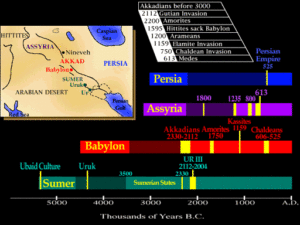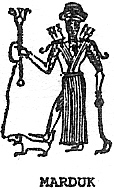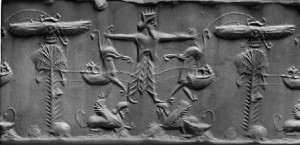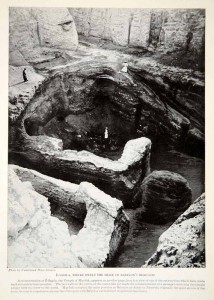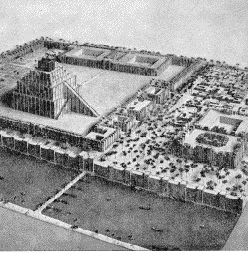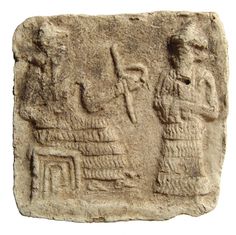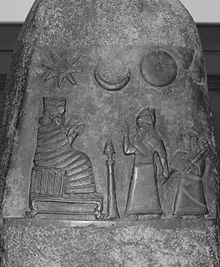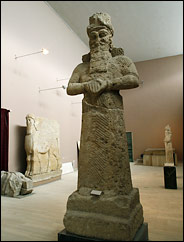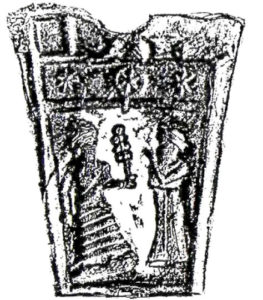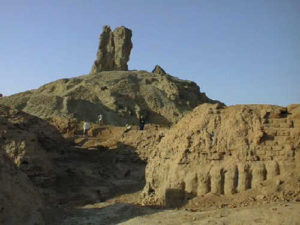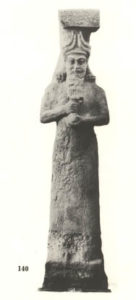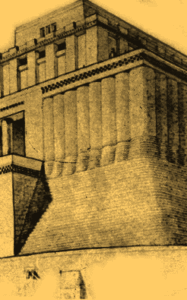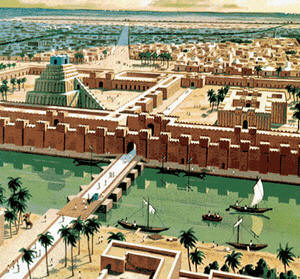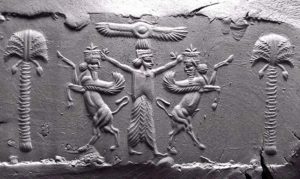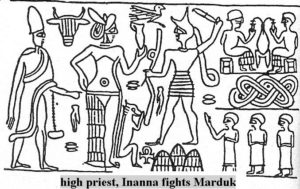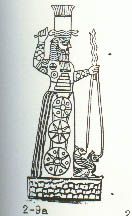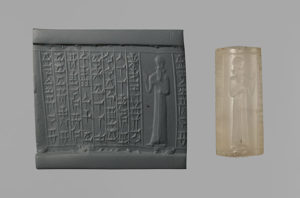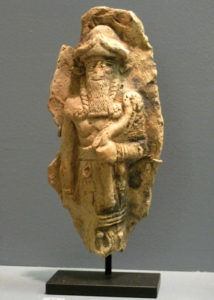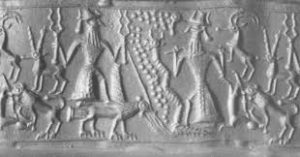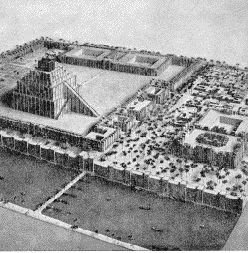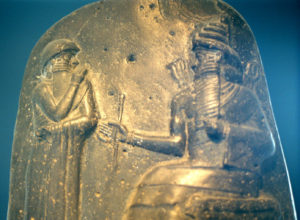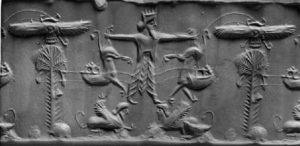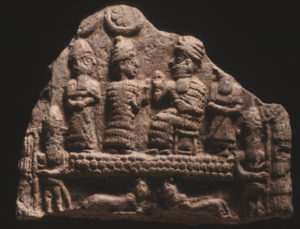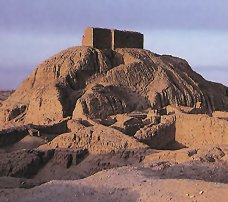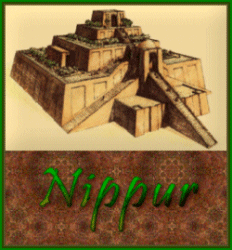Text Source:
-
Library collection: “World’s Greatest Literature”
-
Published work: “Babylonian and Assyrian Literature”
-
Translator: Rev. J. M. Rodwell, M.A.
-
Publisher: P. F. Collier & Son, New York
-
Copyright: Colonial Press, 1901
(Texts: All Artifacts, Color Coding, & Writings in Bold Type With Italics Inside Parenthesis, are Added by Editor R. Brown, not the Authors, Translators, or Publishers!)
(gods in blue)
The reign of Nebuchadnezzar extended from B.C. 604 to 561. In B.C. 598 he laid siege to Jerusalem (2 Kings xxiv.) and made Jehoiachin prisoner, and in 588 again captured the city, and carried Zedekiah, who had rebelled against him, captive to Babylon (2 Kings xxv.). Josephus gives an account of his expeditions against Tyre and Egypt, which are also mentioned with many details in Ezek. xxvii.-xxix.
The name Nebuchadnezzar, or more accurately Nebuchadrezzar (Jer. xxi. 2, 7, etc.), is derived from the Jewish Scriptures. But in the inscriptions it reads Nebo-kudurri-ussur, i.e., “may Nebo protect the crown”; a name analogous to that of his father Nebo(Nabu)-habal-ussur. (“Nebo protect the son”) and to that of Belshazzar, i.e., “Bel protect the prince.” The inscriptions of which a translation follows was found at Babylon by Sir Harford Jones Bridges, and now forms part of the India House Collection. It is engraved on a short column of black basalt, and is divided into ten columns, containing 619 lines.
It may be worth while to remark that in the name given to the prophet Daniel, Belteshazzar, i.e., Balat-su-ussur (“preserve thou his life”), and in Abednego (“servant of Nebo“), we have two of the component parts of the name of Nebuchadnezzar himself.
Column 1
[1.1] Nebuchadnezzar
[1.2] King of Babylon,
[1.3] glorious Prince,
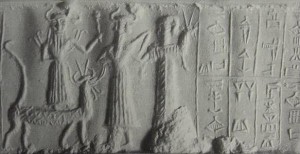
[1.4] worshipper of Marduk,
[1.5] adorer of the lofty one,
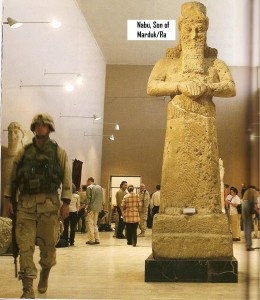
[1.6] glorifier of Nabu,
[1.7] the exalted, the possessor of intelligence,
[1.8] who the processions of their divinitie
[1.9] hath increased;
[1.10] a worshipper of their Lordships,
[1.11] firm, not to be destroyed;
[1.12] who for the embellishment
[1.13] of Bit-Saggatu and Bit-Zida
[1.14] appointed days hath set apart, and
[1.15] the shrines of Babylon
[1.16] and of Borsippa
[1.17] hath steadily increased;
[1.18] exalted Chief, Lord of peace,
[1.19] embellisher of Bit-Saggatu and Bit-Zida,
[1.20] the valiant son
[1.21] of Nabopolassar
[1.22] King of Babylon am I.
[1.23] When he, the Lord god my maker made me,
[1.24] the god Merodach (Marduk), he deposited
[1.25] my seed in my mother’s (womb):
[1.26] then being conceived
[1.27] I was made.
[1.28] Under the inspection of Assur (Osiris) my judge
[1.29] the processions of the god I enlarged,
[1.30] (namely) of Merodach great Lord, the god my maker.
[1.31] His skilful works
[1.32] highly have I glorified;
[1.33] and of Nebo (Nabu) his eldest son (3rd son)
[1.34] exalter of My Royalty
[1.35] the processions (in honor of) his exalted deity
[1.36] I firmly established.
[1.37] With all my heart firmly
[1.38] (in) worship of their deities I uprose
[1.39] in reverence for Nebo their Lord.
[1.40] Whereas Merodach, great Lord,
[1.41] the head of My ancient Royalty,
[1.42] hath empowered me over multitudes of men,
[1.43] and (whereas) Nebo bestower of thrones in heaven and earth,
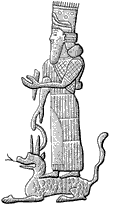
[1.44] for the sustentation of men,
[1.45] a scepter of righteousness
[1.46] hath caused my hand to hold;
[1.47] now I, that sacred way
[1.48] for the resting-place of their divinities,
[1.49] for a memorial of all their names,
[1.50] as a worshipper of Nebo (Nabu), Yav (Adad) and Istar (Inanna),
[1.51] for Merodach (Marduk) my Lord I strengthened.
[1.52] Its threshold I firmly laid, and
[1.53] my devotion of heart he accepted, and
[1.54] him did I proclaim
[1.55] . . . Lord of all beings, and
[1.56] as Prince of the lofty house, and
[1.57] thou, (O Nebuchadnezzar) hast proclaimed the name of him
[1.58] who has been beneficent unto thee.
[1.59] His name, (O god,) thou wilt preserve,
[1.60] the path of righteousness thou hast prescribed to him.
[1.61] I, a Prince, and thy worshipper
[1.62] am the work of thy hand;
[1.63] thou hast created me, and
[1.64] the empire over multitudes of men
[1.65] thou hast assigned me,
[1.66] according to thy favor, O Lord,
[1.67] which thou hast accorded
[1.68] to them all.
[1.69] May thy lofty Lordship be exalted!
[1.70] in the worship of thy divinity
[1.71] may it subsist! in my heart
[1.72] may it continue, and my life which to thee is devoted
(Continued on Column 2)
Column 2
[2.1] mayest thou bless!
[2.2] He, the Chief, the honorable,
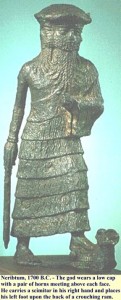
[2.3] the Prince of the gods, the great Merodach,
[2.4] my gracious Lord, heard
[2.5] and received my prayer;
[2.6] he favored it, and by his exalted power,
[2.7] reverence for his deity
[2.8] placed he in my heart:
[2.9] to bear his tabernacle
[2.10] he hath made my heart firm,
[2.11] with reverence for thy power,
[2.12] for exalted service,
[2.13] greatly and eternally.
[2.14] The foundation of his temple it was
[2.15] which from the upper waters
[2.16] to the lower waters
[2.17] in a remote way,
[2.18] in a spot exposed to winds,
[2.19] in a place whose pavements had been broken,
[2.20] low, dried up,
[2.21] a rugged way,
[2.22] a difficult path,
[2.23] I extended.
[2.24] The disobedient I stirred up,
[2.25] and I collected the poor and
[2.26] gave full directions (for the work) and
[2.27] in numbers I supported them.
[2.28] Wares and ornaments
[2.29] for the women I brought forth,
[2.30] silver, molten gold, precious stones,
[2.31] metal, umritgana and cedar woods,
[2.32] (however their names be written)
[2.33] a splendid abundance,
[2.34] the produce of mountains,
[2.35] sea clay,
[2.36] beautiful things in abundance,
[2.37] riches and sources of joy,
[2.38] for my city Babylon,
[2.39] into his presence have I brought
[2.40] for Bit-Saggatu
[2.41] the temple of his power,
[2.42] ornaments for Dakan (Dagan)
[2.43] Bit-Kua, the shrine
[2.44] of Merodach, Lord of the house of the gods,
[2.45] I have made conspicuous with fine linen
[2.46] and its seats
[2.47] with splendid gold,
[2.48] as for royalty and deity,
[2.49] with lapis lazuli and alabaster blocks
[2.50] I carefully covered them over;
[2.51] a gate of passage, the gate Beautiful,
[2.52] and the gate of Bit-Zida and Bit-Saggatu
[2.53] I caused to be made brilliant as the sun.
[2.54] A fulness of the treasures of countries I accumulated;
[2.55] around the city it was placed as an ornament,
[2.56] when at the festival of Lilmuku at the beginning of the year,
[2.57] on the eighth day (and) eleventh day,
[2.58] the divine Prince, Deity of heaven and earth, the Lord god,
[2.59] they raised within it.
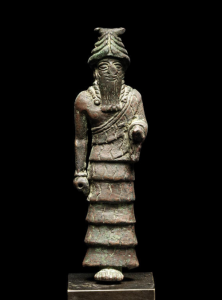
[2.60] (The statue) of the god El (Nannar / Sin), the beauty of the sphere,
[2.61] reverently they bring;
[2.62] treasure have they displayed before it,
[2.63] a monument to lasting days,
[2.64] a monument of my life.
[2.65] They also placed within it
(Continued on Column 3)
Column 3
[3.1] his altar, an altar of Royalty;
[3.2] an altar of Lordship,
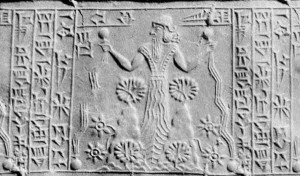
[3.3] (for) the Chief of the gods, the Prince Merodach,
[3.4] whose fashion the former Prince
[3.5] had fashioned in silver,
[3.6] with bright gold accurately weighed out
[3.7] I overlaid.
[3.8] Beautiful things for the temple Bit-Saggatu
[3.9] seen at its very summit,
[3.10] the shrine of Merodach, with statues and marbles
[3.11] I embellished
[3.12] as the stars of heaven.
[3.13] The fanes of Babylon
[3.14] I built, I adorned.
[3.15] Of the house, the foundation of the heaven and earth,
[3.16] I reared the summit
[3.17] with blocks of noble lapis lazuli:
[3.18] to the construction of Bit-Saggatu
[3.19] my heart uplifted me;
[3.20] in abundance I wrought
[3.21] the best of my pine trees
[3.22] which from Lebanon
[3.23] together with tall Babil-wood I brought,
[3.24] for the portico of the temple of Merodach:
[3.25] the shrine of his Lordship
[3.26] I made good, and interior walls
[3.27] with pine and tall cedar woods:
[3.28] the portico of the temple of Merodach,
[3.29] with brilliant gold I caused to cover,
[3.30] the lower thresholds, the cedar awnings,
[3.31] with gold and precious stones
[3.32] I embellished:
[3.33] in the erection of Bit-Saggatu
[3.34] I proceeded: I supplicated
[3.35] the King of gods, the Lord of Lords:
[3.36] in Borsippa, the city of his loftiness,
[3.37, 38] I raised Bit-Zida: a durable house
[3.39] in the midst thereof I caused to be made.
[3.40] With silver, gold, precious stones,
[3.41] bronze, ummakana and pine woods,
[3.42] those thresholds I completed:
[3.43] the pine wood portico
[3.44] of the shrine of Nebo
[3.45] with gold I caused to cover,
[3.46] the pine wood portico of the gate of the temple of Merodach
[3.47] I caused to overlay with bright silver.
[3.48] The bulls and columns of the gate of the shrine
[3.49] the thresholds, the sigari of ri-wood, conduits
[3.50] of Babnaku wood and their statues
[3.51] with cedar wood awnings
[3.52] of lofty building,
[3.53] and silver, I adorned.
[3.54] The avenues of the shrine
[3.55] and the approach to the house,
[3.56] of conspicuous brick
[3.57] sanctuaries in its midst
[3.58] with perforated silver work.
[3.59] Bulls, columns, doorways,
[3.60, 61] in marble beautifully I built;
[3.62, 63] I erected a shrine and with rows
[3.64] of wreathed work I filled it:
[3.65] the fanes of Barsippa
[3.66] I made and embellished:
[3.67] the temple of the seven spheres
[3.68] . . .
[3.69] with bricks of noble lapis lazuli
[3.70] I reared its summit:
[3.71] the tabernacle of Nahr-kanul
[3.72] the chariot of his greatness
(Continued on Column 4)
Column 4
[4.1] the tabernacle, the shrine Lilmuku,
[4.2] the festival of Babylon,
[4.3, 4] his pageant of dignity
[4.5] within it, I caused to decorate
[4.6] with beryls and stones.
[4.7] A temple for sacrifices, the lofty citadel
[4.8] of Bel (Enlil) and Merodach (Marduk), god of gods,
[4.9] a threshold of joy and supremacy
[4.10] among angels and spirits,
[4.11] with the stores of Babylon,
[4.12] with cement and brick,
[4.13] like a mountain I erected.
[4.14] A great temple of Ninharissi (Ninhursag)
[4.15] in the center of Babylon
[4.16] to the great goddess the mother who created me,
[4.17] in Babylon I made.
[4.18] To Nebo (Nabu) of lofty intelligence
[4.19] who hath bestowed (on me) the scepter of justice,
[4.20] to preside over all peoples,
[4.21] a temple of rule over men, and a site for this his temple
[4.22, 23] in Babylon, of cement and brick
[4.24] the fashion I fashioned.
[4.25, 26] To the Moon-god (Nannar / Sin), the strengthener of my hands
[4.27] a large house of alabaster as his temple
[4.28] in Babylon I made.
[4.29] To the sun, the judge supreme
[4.30] who perfects good in my body,
[4.31] a house for that guide of men, even his house,
[4.32, 33] in Babylon, of cement and brick,
[4.34] skilfully did I make.
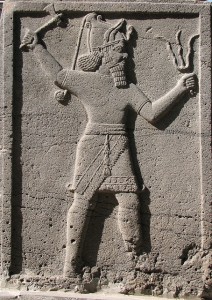
[4.35] To the god Yav (Adad), establisher of fertility
[4.36] in my land, Bit-Numkan as his temple
[4.37] in Babylon I built.
[4.38] To the goddess Gula (Bau), the regulator
[4.39] and benefactress of my life,
[4.40] Bit-Samit, and Bit-haris the lofty,
[4.41, 42] as fanes in Babylon, in cement and brick
[4.43] strongly did I build.
[4.44] To the divine Lady of Bit Anna,
[4.45] my gracious mistress,
[4.46] Bit-Kiku in front of her house
[4.47] so as to strengthen the wall of Babylon
[4.48] I skilfully constructed.
[4.49, 50] To Ninip (Ninurta) the breaker of the sword of my foes
[4.51] a temple in Borsippa I made;
[4.52]and to the Lady Gula
[4.53] the beautifier of my person
[4.54] Bit-Gula, Bit-Tila, Bit-Ziba-Tila,
[4.55] her three temples
[4.56] in Borsippa I erected:
[4.57] to the god Yav (Adad) who confers
[4.58] the fertilizing rain upon my land,
[4.59, 60] his house (also) in Borsippa I strongly built:
[4.61] to the Moon-god who upholds
[4.62] the fulness of my prosperity
[4.63] Bit-ti-Anna as his temple,
[4.64] on the mound near Bit-Ziba
[4.65] I beautifully constructed:
[4.66, 67] Imgur-Bel and Nimetti-Belkit
[4.68] the great walls of Babylon,
[4.69] . . . I built,
[4.70] which Nabopolassar
[4.71] King, King of Babylon, the father who begat me,
[4.72] had commenced but not completed their beauty
(Continued on Column 5)
Column 5
[5.1] Its fosse he dug
[5.2] and of two high embankments
[5.3] in cement and brick
[5.4] he finished the mass:
[5.5, 6] an embankment for pathways he made,
[5.7, 8] Buttresses of brick beyond the Euphrates
[5.9, 10] he constructed, but did not complete:
[5.11, 12] the rest from . . .
[5.13] the best of their lands I accumulated:
[5.14] a place for sacrifice, as ornament,
[5.15, 16] as far as Aibur-sabu near Babylon
[5.17] opposite the principal gate
[5.18] with brick and durmina-turda stone
[5.19] as a shrine of the great Lord, the god Merodach
[5.20] I built as a house for processions.
[5.21, 22] I his eldest son, the chosen of his heart,
[5.23, 24] Imgur-Bel and Nimetti-Bel
[5.25, 26] the great walls of Babylon, completed:
[5.27] buttresses for the embankment of its fosse,
[5.28] and two long embankments
[5.29] with cement and brick I built, and
[5.30] with the embankment my father had made
[5.31, 32] I joined them; and to the city for protection
[5.33, 34] I brought near an embankment of enclosure
[5.35] beyond the river, westward.
[5.36] The wall of Babylon
[5.37, 38] I carried round Aibur-sabu
[5.39] in the vicinity of Babylon:
[5.40] for a shrine of the great Lord Merodach
[5.41, 42] the whole enclosure I filled (with buildings)
[5.43] with brick made of kamina-turda stone
[5.44] and brick of stone cut out of mountains.
[5.45, 46] Aibur-sabu from the High gate,
[5.47, 48] as far as Istar-Sakipat I made,
[5.49, 50] for a shrine for his divinity I made good,
[5.51] and with what my father had made
[5.52, 53] I joined, and built it;
[5.54, 55, 56] and the access to Istar-Sakipat I made,
[5.57, 58] which is Imgur-Bel and Nimetti-Bel,
[5.59] the great gates, the whole temple of the gods
[5.60, 61] in completeness near to Babylon
[5.62] I brought down;
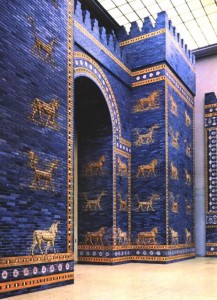
[5.63, 64] the materials of those great gates
[5.65] I put together and
(Continued on Column 6)
Column 6
[6.1] their foundations opposite to the waters
[6.2, 3] in cement and brick I founded,
[6.4] and of strong stone of zamat-hati,
[6.5] bulls and images,
[6.6] the building of its interior
[6.7] skilfully I constructed:
[6.8, 9, 10] tall cedars for their porticos I arranged,
[6.11] ikki wood, cedar wood,
[6.12] with coverings of copper,
[6.13] on domes and arches:
[6.14, 15] work in bronze I overlaid substantially on its gates,
[6.16, 17] bulls of strong bronze and molten images
[6.18] for their thresholds, strongly.
[6.19] Those large gates
[6.20] for the admiration of multitudes of men
[6.21] with wreathed work I filled:
[6.22] the abode of Imzu-Bel
[6.23] the invincible castle of Babylon,
[6.24] which no previous King had effected,
[6.25] 4,000 cubits complete,
[6.26] the walls of Babylon
[6.27] whose banner is invincible,
[6.28] as a high fortress by the ford of the rising sun,
[6.29] I carried round Babylon.
[6.30] Its fosse I dug and its mass
[6.31] with cement and brick
[6.32, 33] I reared up and a tall tower at its side
[6.34] like a mountain I built.
[6.35, 36] The great gates whose walls I constructed
[6.37] with ikki and pine woods and coverings of copper
[6.38] I overlaid them,
[6.39] to keep off enemies from the front
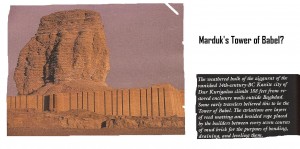
[6.40] of the wall of unconquered Babylon.
[6.41, 42] Great waters like the might of the sea
[6.43] I brought near in abundance
[6.44] and their passing by
[6.45] was like the passing by of the great billows
[6.46] of the Western ocean:
[6.47, 48] passages through them were none,
[6.49, 50] but heaps of earth I heaped up,
[6.51] and embankments of brickwork
[6.52] I caused to be constructed.
[6.53, 54] The fortresses I skilfully strengthened
[6.55] and the city of Babylon
[6.56] I fitted to be a treasure-city.
[6.57] The handsome pile
[6.58, 59] the fort of Borsippa I made anew:
[6.60, 61] its fosse I dug out and in cement and brick
[6.62] I reared up its mass
[6.63] Nebuchadnezzar
(Continued on Column 7)
Column 7
[7.1] King of Babylon
[7.2] whom Merodach, the Sun, the great Lord,
[7.3] for the holy places of his city
[7.4] Babylon hath called, am I:
[7.5] and Bit-Saggatu and Bit-Zida
[7.6] like the radiance of the Sun I restored:
[7.7] the fanes of the great gods
[7.8] I completely brightened.
[7.9] At former dates from the days of old
[7.10] to the days . . .
[7.11] of Nabopolassar King of Babylon
[7.12] the exalted father who begat me,
[7.13] many a Prince who preceded me
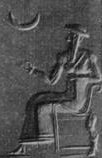
[7.14, 15] whose names El (Nannar / Sin) had proclaimed for royalty
[7.16] for the city, my city, the festivals of these gods
[7.17] in the perfected places
[7.18] a princely temple, a large temple did they make
[7.19] and erected it as their dwelling-places.
[7.20, 21] Their spoils in the midst they accumulated,
[7.22] they heaped up, and their treasures
[7.23] for the festival Lilmuku
[7.24] of the good Lord, Merodach god of gods
[7.25] they transferred into the midst of Babylon;
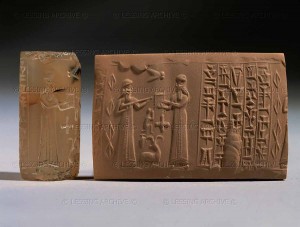
[7.26, 27] when at length Merodach who made me for royalty
[7.28] and the god Nebo (Nabu) his mighty son,
[7.29] committed his people to me
[7.30] as precious lives.
[7.31] Highly have I exalted their cities;
[7.32] (but) above Babylon and Borsippa
[7.33] I have not added a city
[7.34] in the realm of Babylonia
[7.35] as a city of my lofty foundation.
[7.36] A great temple, a house of admiration for men,
[7.37, 38] a vast construction, a lofty pile,
[7.39, 40] a palace of My Royalty for the land of Babylon,
[7.41] in the midst of the city of Baby1on
[7.42, 43] from Imgur Bel to Libit-higal
[7.44] the ford of the Sun-rise,
[7.45] from the bank of the Euphrates
[7.46] as far as Aibur-sabu
[7.47] which Nabopolassar
[7.48] King of Babylon the father who begat me
[7.49, 50] made in brick and raised up in its midst,
[7.51] but whose foundation was damaged
[7.52] by waters and floods
[7.53, 54] at Bit-Imli near Babylon,
[7.55, 56] and the gates of that palace were thrown down,
[7.57, 58] of this the structure with brickwork I repaired
[7.59] with its foundation and boundary wall,
[7.60] and a depth of waters I collected:
[7.61, 62] then opposite the waters I laid its foundation
[7.63] and with cement and brick
(Continued on Column 8)
Column 8
[8.1, 2] I skilfully surrounded it;
[8.3, 4] tall cedars for its porticos I fitted;
[8.5, 6] ikki and cedar woods with layers of copper,
[8.7] on domes and arches
[8.8, 9] and with bronze work, I strongly overlaid its gates
[8.10] with silver, gold, precious stones,
[8.11, 12] whatsoever they call them, in heaps;
[8.13] I valiantly collected spoils;
[8.14] as an adornment of the house were they arranged,
[8.15] and were collected within it;
[8.16, 17] trophies, abundance, royal treasures,
[8.18] I accumulated and gathered together.
[8.19] As to the moving of My Royalty
[8.20] to any other city,
[8.21] there has not arisen a desire:
[8.22] among any other people
[8.23] no royal palace have I built:
[8.24] the merchandise and treasures of my kingdom
[8.25, 26, 27] I did not deposit within the provinces of Babylon:
[8.28] a pile for my residence
[8.29, 30] to grace My Royalty was not found:
[8.31] Therefore with reverence for Merodach my Lord,
[8.32, 33] the exterior and interior in Babylon
[8.34] as his treasure city
[8.35, 36] and for the elevation of the abode of My Royalty
[8.37] his shrine I neglected not:
[8.38] its weak parts which were not completed,
[8.39] its compartments that were not remembered,
[8.40] as a securely compacted edifice
[8.41, 42] I dedicated and set up as a preparation for war
[8.43, 44] by Imgur-Bel, the fortress of invincible Babylon,
[8.45] 400 cubits in its completeness,
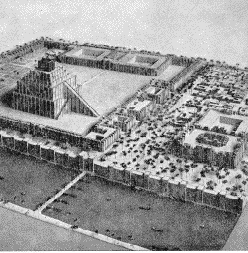
[8.46] a wall of Nimitti-Bel
[8.47] an outwork of Babylon
[8.48, 49] for defense. Two lofty embankments,
[8.50] in cement and brick,
[8.51] a fortress like a mountain I made,
[8.52] and in their sub-structure
[8.53] I built a brickwork;
[8.54] then on its summit a large edifice
[8.55] for the residence of My Royalty
[8.56, 57] with cement and brick I skilfully built
[8.58] and brought it down by the side of the temple:
[8.59] and in the exact middle, on the second day
[8.60] its foundation in a solid depth
[8.61, 62] I made good and its summit I carried round;
[8.63] and on the 15th day its beauty
(Continued on Column 9)
Column 9
[9.1] I skilfully completed
[9.2] and exalted as an abode of Royalty.
[9.3, 4] Tall pines, the produce of lofty mountains,
[9.5] thick asuhu wood
[9.6, 7] and surman wood in choice pillars
[9.8] for its covered porticos I arranged.
[9.9] ikki and musritkanna woods
[9.10] cedar and surman woods
[9.11] I brought forth, and in heaps,
[9.12] with a surface of silver and gold
[9.13] and with coverings of copper,
[9.14, 15] on domes and arches, and with works of metal
[9.16] its gates I strongly overlaid
[9.17] and completely with zamat-stone
[9.18] I finished off its top.
[9.19, 20] A strong wall in cement and brick
[9.21] like a mountain I carried round
[9.22, 23] a wall, a brick fortress, a great fortress
[9.24] with long blocks of stone
[9.25, 26] gatherings from great lands I made
[9.27, 28] and like hills I upraised its head.
[9.29, 30] That house for admiration I caused to build
[9.31] and for a banner to hosts of men:
[9.32] with carved work I fitted it;
[9.33] the strong power of reverence for
[9.34] the presence of Royalty
[9.35] environs its walls;
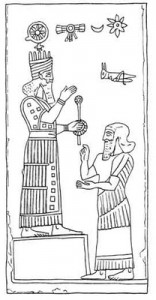 (Ashur & a king)
(Ashur & a king)
[9.36, 37] the least thing not upright enters it not,
[9.38] that evil may not make head.
[9.39] The walls of the fortress of Babylon
[9.40, 41] its defense in war I raised
[9.42] and the circuit of the city of Babylon.
[9.43, 44] I have strengthened skilfully.
[9.45] To Merodach my Lord
[9.46] my hand I lifted:
[9.47] 0 Merodach the Lord, Chief of the gods,
[9.48, 49] a surpassing Prince thou hast made me,
[9.50] and empire over multitudes of men,
[9.51, 52] hast intrusted to me as precious lives;
[9.53] thy power have I extended on high,
[9.54, 55] over Babylon thy city, before all mankind.
[9.56] No city of the land have I exalted
[9.57, 58] as was exalted the reverence of thy deity:
[9.59] I caused it to rest: and may thy power
[9.60, 61] bring its treasures abundantly to my land.
[9.62] I, whether as King and embellisher,
[9.63] am the rejoicer of thy heart
[9.64] or whether as High Priest appointed,
[9.65] embellishing all thy fortresses,
(Continued on Column 10)
Column 10
[10.1, 2] For thy glory, O exalted Merodach
[10.3] a house have I made.
[10.4] May its greatness advance!
[10.5] May its fulness increase!
[10.6, 7] in its midst abundance may it acquire!
[10.8] May its memorials be augmented!
[10.9] May it receive within itself
[10.10] the abundant tribute
[10.11, 12] of the Kings of nations and of all peoples!
[10.13, 14] From the West to the East by the rising sun
[10.15] may I have no foemen!
[10.16] May they not be multiplied
[10.17, 18] within, in the midst thereof, forever,
[10.19] Over the black-headed (earthlings, the gods may not be black-headed) may he rule!
End of Translation
